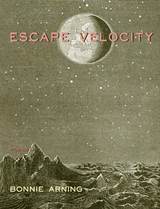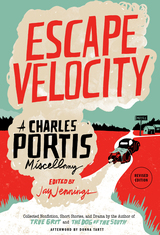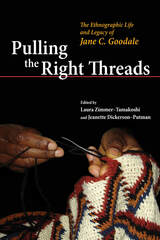
From the moment of a marriage’s heated inception to its period of luminous crowding and onward into distance and darkness, Bonnie Arning’s Escape Velocity asks if it’s possible to exist outside the only universe we’ve ever known. In modes both lyric and narrative, we are given a peephole into the height and decline of a marriage that begins beneath the moving lights of Las Vegas, Nevada, and traverses the devastating terrain of gambling, miscarriage, infidelity, and violence.
Arning gives voice to divergent aspects of love and violence through her use of math problems, erasures, dictionary entries, structured stanzas, and sprawling free verse. This multiplicity of forms comes together to explore everything from pop culture references of domestic violence to cultural notions of victims and victimhood. However dark, collectively these poems tell a love story—an acceptance of our capability to love those who hurt us, but also the love-of-self required to slowly and steadily reach "the velocity to be everleaving."
In the tradition of Eavan Boland and Louise Glück, Arning wrestles down and examines the terrible without flinching. We journey with her, engrossed by each difficult truth: a precipice near which we are both terrified to stand and transfixed by its unnerving insistence on beauty.

For those who care about literature or simply love a good laugh (or both), Charles Portis has long been one of America’s most admired novelists. His 1968 novel True Grit is fixed in the contemporary canon, and four more have been hailed as comic masterpieces. For the first time, his other writings—journalism, travel stories, short fiction, memoir, and even a play—were brought together in Escape Velocity: A Charles Portis Miscellany, published in 2012 as his first new book in more than twenty years. This revised edition includes a new afterword by best-selling author Donna Tartt, who first published her remembrance in the New York Times following Portis’s death in 2020.
All the familiar Portis elements are in this collection: picaresque adventures, deadpan humor, an expert eye for detail and keen ear for the spoken word, and encounters with oddball characters both real and imagined. The collection encompasses the breadth of his fifty-year writing career, from his gripping reportage of the civil rights movement for the New York Herald Tribune to a comic short story about the demise of journalism in the twenty-first century. His three-act play, Delray’s New Moon, was performed onstage in 1996 and published in Escape Velocity for the first time.
Whether this is your first journey to the world of Portis or a long-awaited return to it, you’ll agree with critic Ron Rosenbaum—whose essay appears here alongside tributes by other writers—that Portis “will come to be regarded as the author of classics on the order of a twentieth-century Mark Twain, a writer who captures the soul of America.”

READERS
Browse our collection.
PUBLISHERS
See BiblioVault's publisher services.
STUDENT SERVICES
Files for college accessibility offices.
UChicago Accessibility Resources
home | accessibility | search | about | contact us
BiblioVault ® 2001 - 2024
The University of Chicago Press









